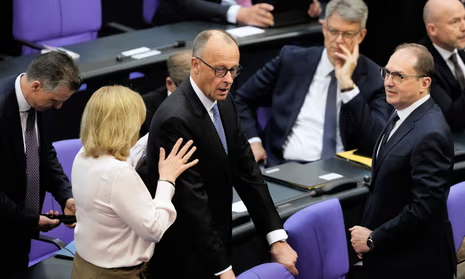BERLIN — German Chancellor Friedrich Merz confirmed Monday that Germany and its Western allies have removed all range restrictions on the weapons supplied to Ukraine, marking a significant shift in military policy as the war with Russia drags on.

Speaking at a forum hosted by Germany’s WDR public television, Merz said that the United States, United Kingdom, France and Germany have now authorized Ukraine to use Western-supplied weapons to strike targets deep inside Russian territory.
“There are no longer any range restrictions for weapons that have been delivered to Ukraine — neither by the British, nor by the French, nor by us, and not by the Americans either,” Merz said.
The move paves the way for Ukraine to launch long-range attacks on Russian military infrastructure previously out of reach under former constraints. “That means Ukraine can also defend itself by, for example, attacking military positions in Russia,” Merz added. “Until a while ago, it couldn’t … it can now.”
Merz, who assumed office nearly three weeks ago, has taken a more assertive stance on arming Ukraine than his predecessor, Olaf Scholz, who had resisted calls to deliver certain long-range munitions such as the Taurus cruise missiles. These missiles have a range of up to 500 kilometers (310 miles) and could significantly bolster Ukraine’s ability to strike far beyond the frontlines.
While the German government has not yet publicly confirmed whether Taurus missiles will be part of future shipments, Merz’s remarks reflect a broader policy realignment. He has previously advocated for supplying Taurus missiles during his tenure as opposition leader and has now embraced a more open-ended support strategy.
Unlike Scholz’s administration, which published detailed inventories of weapons sent to Ukraine, Merz’s government has adopted a policy of “strategic ambiguity” — refraining from disclosing specific military transfers in order to complicate Russian countermeasures.
“Long-range fire,” Merz explained, is the technical term for the updated approach. “It also means supplying Ukraine with weapons that attack military targets in the hinterland,” he said, emphasizing the necessity for Ukraine to disrupt Russian operations beyond the immediate battlefield.
Germany continues to be the second-largest military donor to Ukraine after the United States, delivering advanced systems such as Leopard tanks, IRIS-T air defense units, and heavy artillery. The shift to allowing long-range capabilities signifies an evolution in Berlin’s commitment to Ukraine’s defense and the broader NATO effort to deter Russian aggression.
Since taking office, Merz has sought to solidify Western resolve, engaging with European and transatlantic partners to keep military and humanitarian support for Ukraine robust amid signs of war fatigue in parts of the alliance.
As Russia’s invasion enters its third year, the removal of range restrictions reflects a growing consensus among NATO members that Ukraine should be empowered to take the fight to Russian soil, especially against logistical hubs and command centers supporting Moscow’s war machine.



